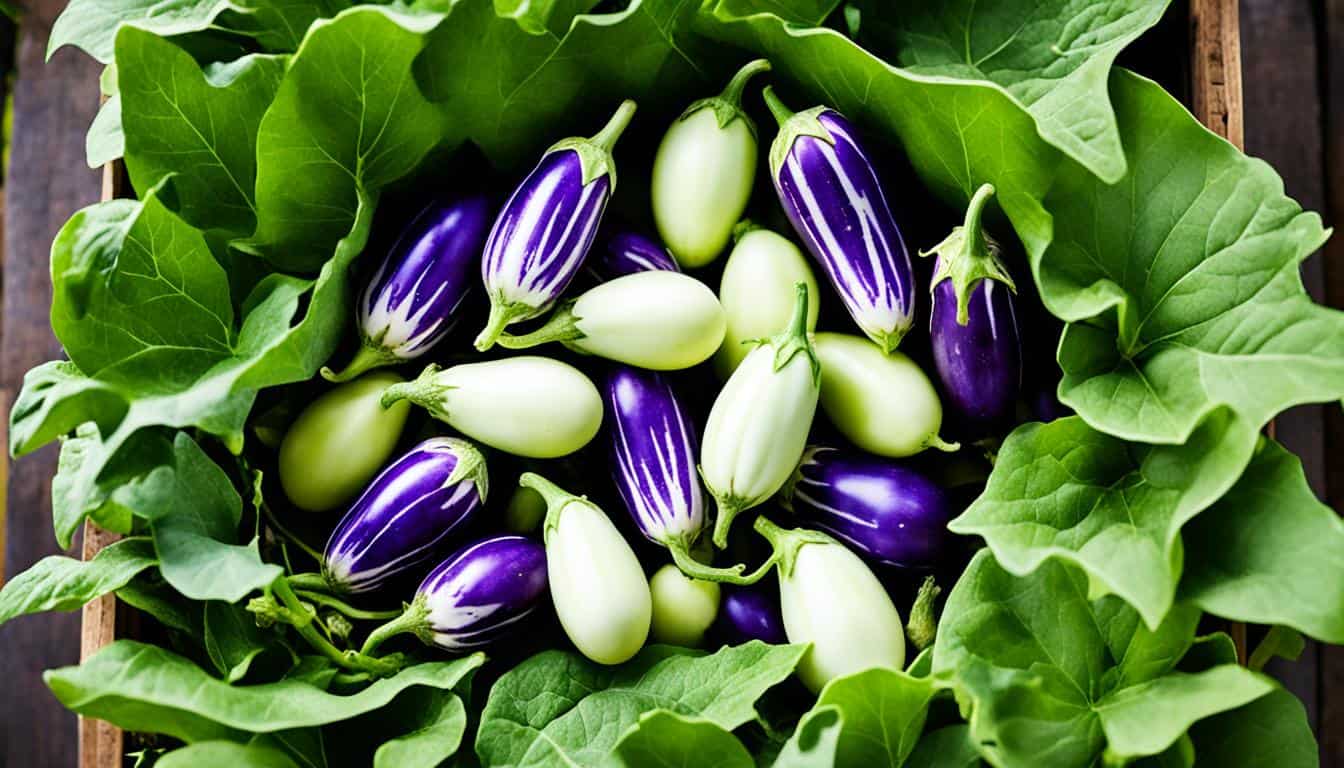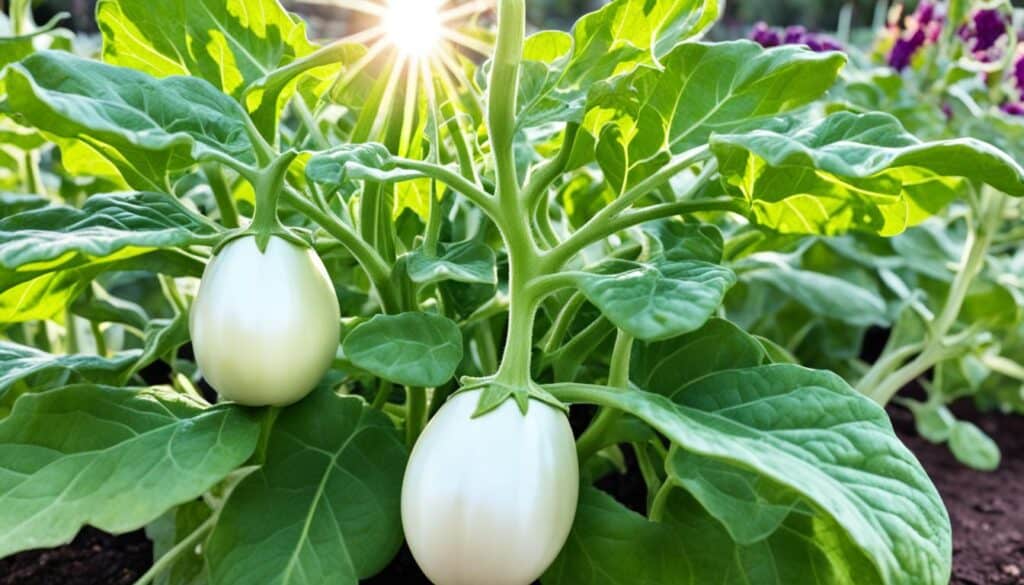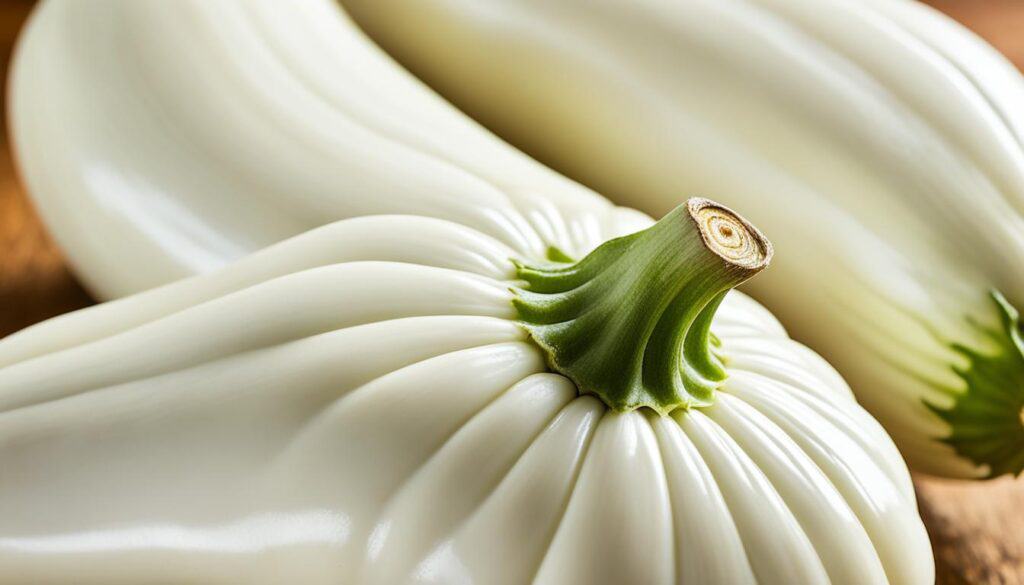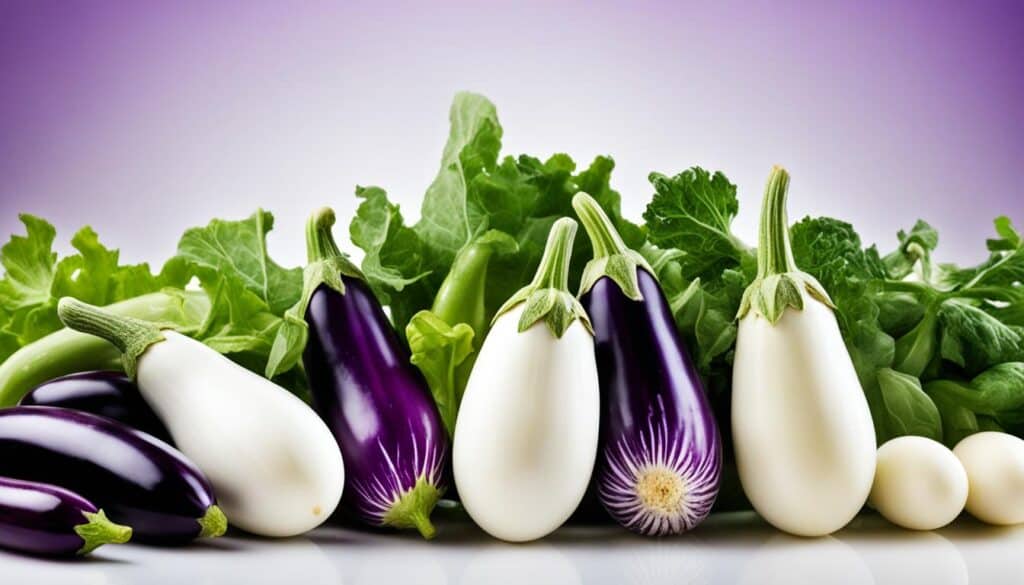Did you know that there is an eggplant variety with a color other than purple? Yes, you heard it right! White eggplant is a fascinating and lesser-known member of the eggplant family. With its ivory to cream-colored skin and tender flesh, white eggplant offers a whole new culinary experience. Whether you’re a fan of traditional eggplant dishes or looking to explore unique flavors, white eggplant is a versatile ingredient that deserves a place in your kitchen.
Key Takeaways:
- White eggplant is a variety of eggplant with ivory to cream-colored skin.
- It has a mild, subtly sweet taste with nutty and mushroom-like nuances.
- White eggplant is less bitter and acidic compared to purple eggplants.
- It can be used in a wide range of culinary preparations, from salads to stir-fries.
- White eggplant is a good source of potassium, fiber, vitamins, and minerals.
Description and Taste of White Eggplant
White eggplants come in a variety of shapes and sizes, offering a delightful array of possibilities for culinary creations. These eggplant varieties have a round, oval, or oblong shape, measuring between 7 to 25 centimeters in length. The skin is smooth, taut, and characterized by its semi-firm texture. It showcases beautiful ivory-colored hues, ranging from creamy white to pale ivory.
The flesh of white eggplants is truly unique, boasting a dense, tender, and spongy texture. Its ivory-colored flesh is not only visually stunning but also offers a delightful culinary experience. The taste of white eggplant is milder and more subtly sweet compared to its purple counterparts. It features a delicate flavor profile with nutty and mushroom-like nuances, making it an excellent choice for a wide range of dishes.
The gently tapered ends and the green to green-brown cap of the calyx add to the aesthetic appeal of white eggplants, making them a visually striking addition to any dish.
Seasons and Availability of White Eggplant
When it comes to white eggplants, their availability and seasons depend on the method of cultivation. In open fields and gardens, they are typically found during the summer months, adding a unique touch to seasonal dishes. However, the story doesn’t end there! Through greenhouse production, white eggplants can be enjoyed year-round, offering a delightful and versatile ingredient for all your culinary creations.
Despite their charm and culinary appeal, white eggplants are not as commonly available as their purple counterparts in commercial markets. Nevertheless, you can still explore their wonders through local farmers’ markets, specialty stores, or by growing your own. Let’s dive deeper into the different sources of white eggplants:
Grown in Open Fields and Gardens
In the warmth of the summer, open fields and gardens are bustling with the vibrant hues of white eggplants. This season presents the perfect opportunity to savor the delicate taste and smooth texture that these ivory gems offer. Whether you’re grilling, roasting, or stir-frying, white eggplants will add a touch of elegance and flavor to your summer recipes.
Greenhouse Production: Year-Round Wonder
Thanks to greenhouse production, the magic of white eggplants is no longer confined to summer alone. These controlled environments create optimal conditions for cultivation, allowing white eggplants to be grown and enjoyed all year long. Whether it’s the middle of winter or the peak of spring, you can always count on the availability of these delightful vegetables.
So, whether you prefer to savor the flavors of summer or enjoy the year-round abundance that greenhouse production brings, white eggplants are sure to add a touch of elegance and versatility to your culinary endeavors.
Don’t miss out on the opportunity to explore the unique taste and culinary possibilities that white eggplants offer. Keep an eye out for these pale beauties during their seasonal peak and uncover the endless possibilities they bring to your kitchen.
Nutritional Value of White Eggplant
White eggplants offer a range of nutritional benefits that make them a valuable addition to your diet. They are packed with essential vitamins, minerals, fiber, and other important nutrients to support your overall health. Let’s explore the nutritional value of white eggplant:
Potassium
White eggplants are a good source of potassium, a vital mineral that plays a crucial role in maintaining proper fluid balance in the body. Potassium is involved in various physiological processes, including nerve function, muscle contractions, and heart health.
Fiber
White eggplants provide dietary fiber, which is essential for a healthy digestive system. Fiber promotes regular bowel movements, prevents constipation, and aids in maintaining a healthy weight. It also helps control blood sugar levels and reduces the risk of heart disease.
Vitamins
White eggplants contain a variety of vitamins that contribute to overall wellness. These include:
- Vitamin C: Known for its immune-boosting properties, vitamin C also acts as an antioxidant, protecting cells from damage caused by free radicals.
- Vitamin K: Essential for blood clotting and bone health, vitamin K plays a crucial role in preventing excessive bleeding and maintaining strong bones.
- Niacin: Also known as vitamin B3, niacin supports energy production, proper nervous system function, and healthy skin.
- Folate: Folate, or vitamin B9, is important for cell division and DNA synthesis. It is particularly crucial during pregnancy for the growth and development of the fetus.
Minerals
White eggplants contain essential minerals that contribute to overall well-being. Some key minerals found in white eggplants include:
- Magnesium: This mineral is involved in more than 300 biochemical reactions in the body, including energy production, muscle and nerve function, and bone health.
- Manganese: Manganese is essential for bone development, metabolism, and the body’s antioxidant defense system. It also supports normal brain function.
Additionally, white eggplants are low in calories and fat, making them a nourishing and figure-friendly addition to any meal.
Now that we’ve explored the incredible nutritional value of white eggplant, let’s move on to the culinary uses and versatility of this unique vegetable.
Culinary Uses of White Eggplant
White eggplants are incredibly versatile and can be prepared in various delicious ways. Their mild and sweet taste pairs well with a wide range of flavorings, making them a popular choice in cuisines around the world. Let’s explore some of the culinary uses, cooking methods, and recipes featuring these delightful eggplants.
Sautéing
One of the simplest ways to cook white eggplant is by sautéing. Slice the eggplant into thin rounds or cubes and toss them in a hot pan with a little olive oil, salt, and pepper. Sauté until the eggplant is tender and golden brown. This method brings out the natural sweetness of the eggplant while adding a slightly caramelized flavor.
Grilling
Grilling white eggplant lends a smoky and charred flavor, perfect for summer cookouts. Cut the eggplant into thick slices or halves, brush with olive oil, and season with your favorite herbs and spices. Place the eggplant directly on the grill and cook until grill marks appear and the eggplant is soft and creamy. Grilled white eggplant can be served as a side dish, added to salads, or used as a delicious burger patty substitute.
Baking
Baking is another wonderful way to cook white eggplant. Prepare a delicious eggplant parmesan by layering thinly sliced eggplant with tomato sauce, mozzarella cheese, and grated Parmesan. Bake in the oven until the cheese is bubbly and golden brown. You can also use white eggplant in casseroles and gratins for a creamy and comforting dish.
Stuffed Dishes
White eggplants are perfect for stuffing with a variety of tasty fillings. Prepare a delicious vegetarian stuffed eggplant by hollowing out the center and filling it with a mixture of cooked grains, vegetables, and seasonings. Bake in the oven until the eggplant is tender and the filling is heated through. Stuffed white eggplants can also be served as an elegant main course or side dish.
Curries and Soups
White eggplants add a unique flavor and texture to curries and soups. They absorb the aromatic spices and flavors, making them a delightful addition to these dishes. Cut the eggplant into bite-sized pieces and simmer them in a flavorful curry or soup base until they are tender and fully cooked.
Recipes
If you’re looking for specific recipes featuring white eggplant, here are a few ideas to get you started:
- White Eggplant and Tomato Salad
- Grilled White Eggplant with Herbed Yogurt Sauce
- Eggplant Parmesan with White Eggplant
- Stuffed White Eggplant with Quinoa and Roasted Vegetables
- Curried White Eggplant and Chickpea Stew
Experiment with different cooking methods and recipes to discover your favorite culinary uses for white eggplant. Its versatile nature and mild flavor make it an excellent ingredient for a wide range of dishes. Let your creativity shine in the kitchen as you explore the delightful world of white eggplant!
How to Grow White Eggplant
If you’re interested in cultivating white eggplants in your garden, here are some valuable tips to help you succeed:
1. Selecting the Right Climate
White eggplants can adapt to various climates, but they thrive best in warm and sunny conditions. Ensure your growing location receives at least 6-8 hours of direct sunlight daily.
2. Preparing the Soil
White eggplants prefer well-draining soil with a pH level of 6.0 to 6.5. Enhance the soil by adding organic matter, such as compost or aged manure, to improve fertility and moisture retention.
3. Starting Seeds Indoors
Begin by sowing white eggplant seeds indoors, approximately 6-8 weeks before the last expected frost. Use seed trays or small pots filled with seed-starting mix. Maintain a consistent temperature of 70-85°F (21-29°C) to promote germination.
4. Transplanting Outdoors
Once the danger of frost has passed and the seedlings have developed a few sets of true leaves, transplant them outdoors. Choose a sunny spot with well-draining soil.
5. Proper Spacing and Airflow
Ensure adequate spacing between white eggplant plants to allow for proper growth and airflow. Place them approximately 18-24 inches (45-60 cm) apart, depending on the variety’s growth habit.
6. Watering and Moisture Maintenance
White eggplants require consistent moisture to thrive. Water the plants regularly, ensuring the soil remains consistently moist but not waterlogged. Aim to provide approximately 1-1.5 inches (2.5-3.8 cm) of water per week, adjusting as necessary depending on weather conditions.
7. Fertilization and Pest Control
Regular fertilization with a balanced vegetable fertilizer can promote healthy growth and abundant fruiting. Monitor your plants for common pests, such as aphids, flea beetles, and spider mites. Take appropriate measures, such as using organic insecticides or implementing companion planting techniques, to control pests and maintain plant health.
With these tips in mind, you’ll be well on your way to successfully growing your own white eggplants. Enjoy the satisfaction of harvesting and savoring these delicious and unique vegetables!
History and Culture of White Eggplant
White eggplants have a rich history and cultural significance, originating from Asia. These unique vegetables can trace their roots back to countries such as India, Burma, Vietnam, Thailand, and China, where wild plants of white eggplants were discovered. Throughout ancient times, people in these regions cultivated and cherished white eggplants, incorporating them into their traditional cuisines.
The introduction of white eggplants to other parts of the world can be credited to the extensive trade routes that existed throughout history. As merchants traveled across continents, they brought along the delicate seeds of these ivory gems, sharing their culinary secrets and expanding the global appreciation for white eggplants.
“The name ‘eggplant’ originated in England in the 18th century when white eggplants, shaped like eggs, gained popularity.”
It was in England during the 18th century that the name “eggplant” emerged. White eggplants, with their distinctive egg-like shape, became a sensation among the culinary enthusiasts of the time. As a result, this moniker became synonymous with the vegetable, encompassing both white and purple varieties. Since then, the name “eggplant” has remained in common use, signifying the unique vegetable that we enjoy today.
Cultural Heritage
White eggplants hold significant cultural value in the regions where they originated. In Asian cuisines, these eggplants are featured in a variety of traditional dishes that showcase their delicate flavor and texture. Their pristine ivory appearance symbolizes purity and elegance in culinary presentations, making them prized ingredients in festive and celebratory meals.
Symbolism and Culinary Traditions
Beyond their culinary uses, white eggplants have also taken on symbolic meanings in various cultures. In some Asian societies, white eggplants are believed to bring good luck, prosperity, and fertility when consumed. These beliefs have led to the inclusion of white eggplants in special occasions such as weddings, New Year celebrations, and other auspicious events.
As white eggplants have spread across the globe, they have assimilated into the culinary traditions of different cultures. Chefs and home cooks alike have found creative ways to incorporate these versatile vegetables into their own unique dishes, resulting in a diverse array of white eggplant recipes that span continents.
The history and cultural significance of white eggplants add an extra layer of appreciation when enjoying these delectable vegetables. From their Asian origins to their global presence, white eggplants continue to captivate our taste buds and inspire culinary exploration.
Popular Varieties of White Eggplant
When it comes to white eggplants, there are several popular varieties that stand out for their unique characteristics and culinary potential. Let’s take a closer look at these fantastic cultivars:
Casper
Aptly named after the friendly ghost, Casper, this white eggplant variety features a round to oval shape and a creamy white skin. Its tender flesh has a delicate flavor, making it perfect for roasting, grilling, or adding to stews and curries.
Easter Egg
Easter Egg white eggplants add an element of surprise to your culinary creations. With their small, egg-like shape, these petite eggplants are both adorable and delicious. Their mild taste and smooth texture make them ideal for stuffing or using in Mediterranean-inspired dishes.
White Beauty
White Beauty eggplants are not only visually stunning with their pearlescent skin, but they also offer a delightful texture and taste. Their elongated shape and slightly sweeter flavor make them a fantastic choice for grilling, baking, or incorporating into pasta dishes.
Ghostbuster
The Ghostbuster white eggplant variety is known for its striking appearance and remarkable taste. Its pale skin and elongated shape set it apart, while its creamy flesh delivers a mild and creamy flavor. This variety shines when used in stir-fries, sautés, or as a grilled vegetable option.
Paloma
Rounding out our list of popular white eggplant varieties is Paloma. With its oval shape and smooth, white skin, Paloma offers a mild and slightly nutty flavor. Its firm texture holds up well during cooking, making it an excellent choice for roasting, frying, or using in hearty vegetable dishes.
Each of these popular white eggplant varieties brings its own unique attributes to the table. Whether you’re looking for a delicate flavor, an eye-catching appearance, or a versatile cooking ingredient, these cultivars won’t disappoint.
Conclusion
White eggplant is truly a versatile vegetable that stands out with its unique flavor and culinary diversity. Whether you’re looking to add a subtle sweetness to your salads or create savory stir-fries, white eggplant is up to the task. Its mild taste also makes it a fantastic meat substitute for those seeking alternative options.
In addition to its culinary merits, white eggplant offers numerous nutrition benefits. Packed with potassium, fiber, vitamins, and minerals, it contributes to a well-rounded diet. The presence of essential nutrients like vitamin C, vitamin K, niacin, and folate contribute to the overall nutritional value of this remarkable vegetable.
With a rich history and cultural significance dating back centuries, white eggplant has captured the hearts and taste buds of people around the world. Its distinct flavor and versatility have made it a staple in various cuisines, spanning continents and bringing joy to countless tables. Whether you’re an adventurous cook or a health-conscious individual, white eggplant is a worthy addition to your culinary repertoire.









Leave a Reply